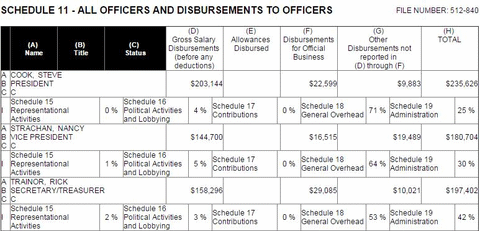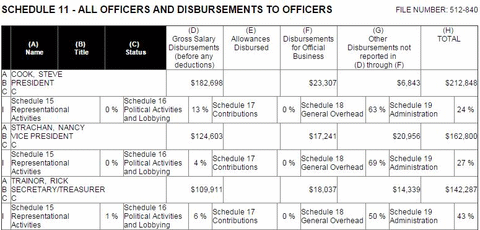School Budgets Safe Under ‘No New Taxes’ House Road Funding Package
Critics ignore key provisions in bills
When House Republicans passed a version of road funding legislation Dec. 4 that did not include a tax increase, a cry went up that this would jeopardize appropriations for schools and local government revenue sharing. However, regardless of one’s opinion of the overall usefulness of the plan, the plan would not cause school and local government funding cuts.
The measure, House Bill 4539, would phase out the 6-percent sales tax on gas and diesel motor fuel sales over a six-year period beginning Jan. 1, 2016. This tax, which is collected at the pump, is used primarily to provide some of the funding that goes to schools and local governments.
At the same time, legislation linked to HB 4539 would phase in a wholesale gasoline tax to gradually replace the sales tax as it was being phased out. Once the phase-out and phase-in were completed, all taxes collected at the pump would be earmarked for roads. As a result, there would be about $1 billion in additional funding for roads, with no overall tax increase.
House Speaker Jase Bolger, R-Marshall, and his Republican colleagues who support the package argue that the projected state revenue growth will provide enough additional dollars to make up for any potential funding losses to schools and local governments resulting from the tax shift. The claim is backed by language in the bills specifying that if a future legislature fails to appropriate at least as much to schools and local governments as the previous year – using revenue from other taxes – the 6-percent sales tax would automatically be re-imposed on fuel.
Nevertheless, despite the apparent funding guarantee, rhetoric suggesting otherwise continues.
“There are a number of bills and proposals to raise money to fix our roads that don’t take money away from other parts of our budget, and those are the proposals we should be considering,” said Rep. Marilyn Lane, D-Fraser, on the House Democratic Caucus website. “Our roads and bridges are in dire need of repairs, but taking more money out of our schools to do this is not a solution.”
The primary reason Gov. Rick Snyder gives for his not supporting the House road funding plan is that it wouldn’t bring in the $1.2 billion he says is needed for road funding quickly enough. However, the Governor has also alluded to the school and local government funding concerns.
“I commend the Senate for its earlier approval of a comprehensive plan, and appreciate recent action by the House that continues this critical dialogue,” Gov. Snyder was quoted as saying recently. “But we need to reach agreement on a long-term, sustainable action plan that gets a $1.2 billion solution sooner and alleviates unintended consequences for our schools and local communities. Let’s finish the job.”
The “comprehensive plan” Gov. Snyder commended the Senate for passing was its version of House Bill 5477, which would replace the current 19-cent per gallon gas tax and 15-cent diesel tax with a 9.5-percent wholesale fuel tax, gradually increasing to 15.5 percent in 2018. When fully phased-in this would represent a net tax increase of around $1 billion annually, more than doubling current fuel taxes to 41 cents per gallon.
Allegations that the House plan places school and local government funding at risk ignore another key factor, which is that lawmakers ultimately control funding. If revenue falls short, nothing prohibits a future legislature from trimming or eliminating other spending to shore up school and local government revenue sharing budgets. The rhetoric about placing school and local government funding at risk hints that in the face of less than expected revenue lawmakers would be powerless to tap other parts of the budget to make up the difference. This is simply not true.
“It's a variation on the old ‘Washington Monument’ ploy, where politicians claim the government is so efficient that even a one dollar cut would require eliminating some high profile item the public cares about,” said Jack McHugh, senior legislative analyst with the Mackinac Center for Public Policy. “The House plan anticipates that with Michigan’s economy in recovery mode the tax shift would be made up by other revenues. But even if it didn't, there are many other items on which this state spends its annual $30 billion in (non-federal) revenue that only particular special interests would miss.”
Considering the political pressures surrounding school and local government funding (see the recent gubernatorial election campaign), it seems improbable that revenue shortfalls would place school and local revenue sharing on the chopping block. Other programs ranging from film and other corporate welfare subsidies to discretionary line items like agriculture-related research would be more likely to face the ax.
Another concern is that under House road funding plan a future legislature might purposely let school and local government funding lag in order to kick the sales tax back into the mix of taxes collected at the pump.
When asked about that possibility Ari Adler, spokesman for Speaker Bolger, said:
“If a future legislature did that, drivers would see no difference in the price they’d pay at the pump, because if the sales tax is added back in, the fuel tax rate would automatically fall back (to 7.5 percent),” Adler said. “But those legislators would still have to explain to the voters why they had allowed that six percent sales tax, (which would not be going toward maintaining the roads) to become part of this again.”
Adler was also asked if it would be accurate to say the goal of the House plan is ultimately to force the legislature to do more prioritizing and make some cuts if that becomes necessary.
“As the Speaker has said previously, this plan forces funding for roads, schools and local governments to be priorities,” Adler said. “The only disagreement between the House and Senate is on what the level of the gas tax should be. We have agreed on every other aspect of the road funding issue. The House is saying we want to keep the gas tax at its current level and eliminate the sales tax from what drivers pay at the pump. The Senate is saying they want to increase the gas tax and keep the sales tax as part of what drivers are paying.”
Michigan Capitol Confidential is the news source produced by the Mackinac Center for Public Policy. Michigan Capitol Confidential reports with a free-market news perspective.


 Whitmer’s $83.5B budget won’t fix the roads, lawmakers say
Whitmer’s $83.5B budget won’t fix the roads, lawmakers say
 Whitmer seeks $7.8M for road funding solution, six years after pledging to fix the roads
Whitmer seeks $7.8M for road funding solution, six years after pledging to fix the roads
 Michigan’s got the bloated budget blues
Michigan’s got the bloated budget blues


 Five years later, Whitmer can unilaterally shut down the state
Five years later, Whitmer can unilaterally shut down the state
 Michigan Education Association’s power is on a long decline
Michigan Education Association’s power is on a long decline
 MEA head boasts of membership growth, but numbers tell a different story
MEA head boasts of membership growth, but numbers tell a different story